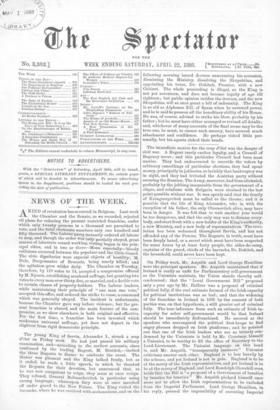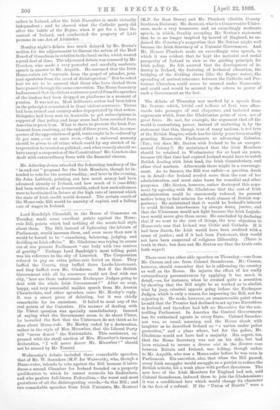On Friday week, Mr. Asquith and Lord George Hamilton were
the principal speakers. Mr. Asquith maintained that if Ireland is really as unfit for Parliamentary self-government as the Unionists maintain, the Union stands thereby self- condemned ; that the 'Local Government Bill" proposed only a year ago by Mr. Balfour was a proposal of criminal political folly, if the real estimate formed of the Irish capacity for political institutions was so bad ; and that the widening of the franchise in Ireland in 1885 by the consent of both parties was, on that hypothesis, a still greater act of criminal folly. The true inference from such an estimate of Irish in- capacity for sober self-government would be that Ireland should be immediately disfranchised. He sneered at the speakers who scavengered the political dust-heaps to find angry phrases dropped on Irish platforms ; and he pointed out that one of the Irish leaders who are so bitterly con- demned by the Unionists is held by Mr. Courtney, himself a Unionist, to be worthy to fill the office of Secretary to the Lord-Lieutenant. The Unionist language on thishead is, said Mr. Asquith, "transparently insincere." Unionist criticisms answer each other. England is to lose heavily by the scheme, and yet Ireland is not to gain. England is to be at the mercy of the Irish representatives, and yet Ireland is to be at the mercy of England, and Lord Randolph Churchill even holds that the Bill is "a proposal of a Government of lunatics by lunatics for lunatics." Mr. Asquith pledged himself once more not to allow the Irish representatives to be excluded from the Imperial Parliament. Lord George Hamilton, in his reply, pressed the impossibility of executing Imperial orders in Ireland, after the Irish Executive is made virtually independent ; and he showed what the Catholic party did after the battle of the Boyne, when it got for a time the control of Ireland, and confiscated the property of 2,445 persons in one Act of Attainder.







































